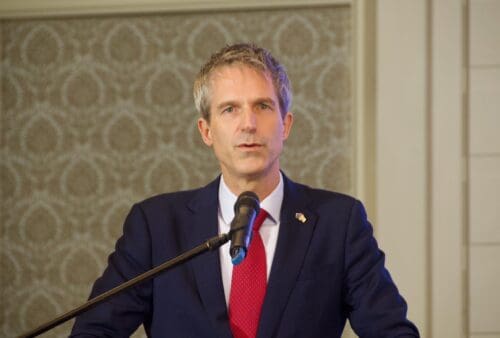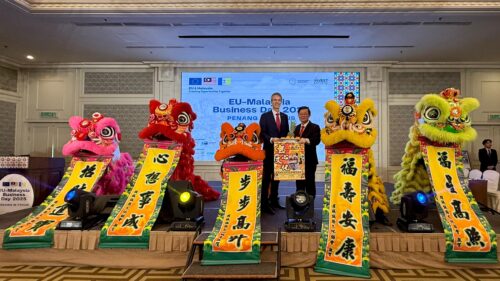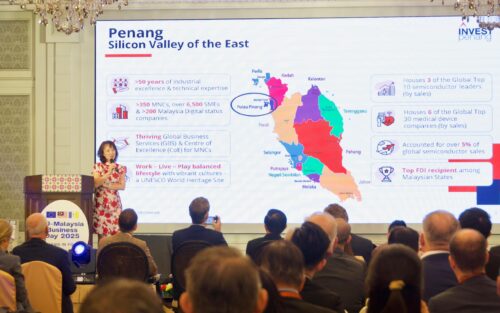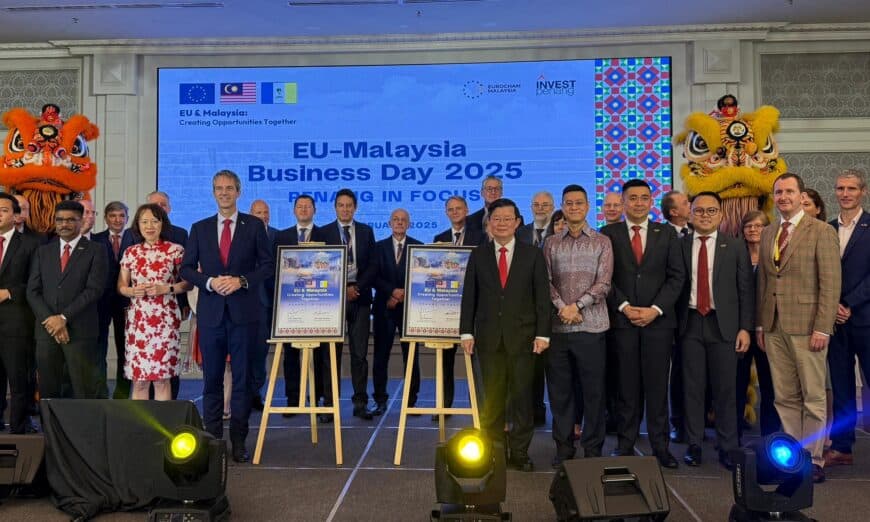THE European Union (EU) and Malaysia are set to strengthen their economic ties, with renewed trade negotiations and enhanced business cooperation, according to Ambassador of the European Union to Malaysia Rafael Daerr.
Speaking at a business forum in Penang, he stressed the strong trade and investment relationship between the two economies and outlined plans for deeper engagement.

A Strong Trade Relationship
Malaysia is a key player in global trade, ranking as the 35th largest economy in the world.
In 2023, the country was the EU’s 16th largest source of imported goods, reinforcing its position as a successful trading nation.
Meanwhile, the EU remains the world’s most significant single market, with a population of 450 million and a trade volume of €7.6 trillion in goods and services in 2023. Additionally, the EU is the largest global investor, holding 31.9% of outward foreign direct investment (FDI) stocks and 25.2% of inward FDI stocks.
At least 150,000 jobs in Malaysia have been created by EU companies, underscoring the strong economic footprint of European businesses in the country.
“Malaysia and the European Union share a commitment to free trade for the benefit of all. The EU is a reliable and trustworthy partner – our interests are transparent and come with no strings attached,” Daerr said in his speech during the EU-Malaysia Business Day 2025 ‘Penang in Focus’ event at E&O Hotel, Penang, today.
Highlighting EU’s Business Footprint in Malaysia
In collaboration with EU Member States’ embassies, the EU delegation has launched a study on the EU’s Business Footprint in Malaysia to enhance the visibility of its economic contributions.
This initiative aims to provide a comprehensive overview of the impact of European businesses and investors in Malaysia, including trade, employment, skills training, and environmental contributions.
“The goal is to clarify where investments originate, stimulate further capital inflows, and foster greater synergy among companies,” Daerr explained.
Resumption of EU-Malaysia Free Trade Agreement Talks
A major development in EU-Malaysia relations is the decision to resume negotiations on a Free Trade Agreement (FTA). The announcement was made following Malaysian Prime Minister Anwar Ibrahim’s visit to EU institutions on Jan 20, 2025. The agreement, once finalised, is expected to be comprehensive, modern, and mutually beneficial.
“Just two months into the new EU mandate, we have concluded partnerships with Mercosur, Mexico, and Switzerland, restarted negotiations with Malaysia, and are in talks with other ASEAN members,” said Daerr, highlighting the EU’s proactive approach to trade diplomacy.
While trade negotiations are a complex and time-consuming process, the ambassador emphasised that their resumption sends a strong signal to economic operators and investors.
He also noted that Penang, as a key trade hub, stands to gain significantly from expanded EU-Malaysia economic ties.
EU’s Global Gateway Initiative in Malaysia
Beyond trade negotiations, the EU is also focusing on sustainable development through its Global Gateway initiative. This strategic investment programme aligns with Malaysia’s ASEAN chairmanship priorities, particularly in fostering inclusivity and sustainability.
The initiative aims to support high-quality infrastructure and green energy projects, especially in sectors related to digital and environmental transformation – key areas of interest for Penang and the broader Malaysian economy.
Penang’s Role in Strengthening EU-Malaysia Trade Relations
In his speech at the event, Penang Chief Minister Chow Kon Yeow emphasised the state’s crucial role in driving Malaysia’s economic growth and investment appeal.
Recognised as the ‘Silicon Valley of the East’, Penang has transformed from a traditional seaport economy into a global manufacturing hub, particularly in high-tech industries. The state contributes about 5% of global semiconductor exports, making it a key player in the international electronics sector.
Penang consistently ranks as one of the top recipients of FDI in Malaysia.
In 2023, the state secured RM60.1 billion in approved manufacturing investments, representing 47% of Malaysia’s total. Of this, 96% was concentrated in the electronics, electrical, machinery, and chemical sectors.
Between 2019 and 2023, Penang attracted RM99.8 billion in approved manufacturing investments from the EU, accounting for 51% of the state’s total approved investments. Major European investors include Robert Bosch, Boston Scientific, Benchmark, and Lumileds.
On the trade front, Penang remains a top contributor to Malaysia’s exports. In 2023, the state recorded RM435 billion in exports, making up 31% of the country’s total.
From 2019 to 2023, Penang accounted for, on average, 58% of Malaysia’s electronics and electrical (E&E) exports, valued at RM341 billion. Trade with the EU amounted to RM140 billion, representing 7% of Penang’s total exports, during the same five-year period.

Future Growth Strategies
To sustain its economic leadership, the Penang government has launched several initiatives, including the Penang Strategy for Economic Ecosystem Development (Penang SEED).
This five-year plan aligns with Penang2030 vision and focuses on workforce development, technological innovation, infrastructure enhancement, and sustainability.
The state is working closely with industry leaders to drive high-value sector growth and ensure Penang remains at the forefront of economic and technological advancements.
Additionally, Penang is advancing sustainability through its Green Industry Programme, which aims to enhance the productivity and environmental performance of local businesses while reducing industrial emissions.
Infrastructure projects like the Penang Transport Master Plan (PTMP), including the expansion of Penang International Airport and the Mutiara LRT Line, are expected to improve global connectivity and boost economic efficiency.
The recently launched Penang Silicon Design @ 5km+ initiative further strengthens the state’s semiconductor ecosystem. With key components such as the Penang IC Design Academy, the Penang IC Design & Digital Park, and the Silicon Research & Incubation Space, this initiative positions Penang as a global hub for Integrated Circuit (IC) design and semiconductor innovation, benchmarking itself against leading design hubs in Silicon Valley, the United States, and Taiwan.
Moving Forward
The Chief Minister reaffirmed Penang’s commitment to fostering a dynamic and investment-friendly environment for EU businesses.
“We are faced with opportunities to forge stronger partnerships and tackle challenges in the ever-shifting global semiconductor landscape.
“The EU-Malaysia Business Day is timely, bringing together industry leaders and stakeholders to exchange insights and explore collaborations for the future,” he said.
Chow assured attendees that the state government, through InvestPenang, will continue to provide a conducive environment for EU businesses to thrive, innovate, and contribute to Malaysia’s economic success.
“Together, we are shaping a future of sustainable growth, resilience, and shared success,” he concluded.

Among those present were state executive council (exco) members Zairil Khir Johari, Wong Hon Wai, H’ng Mooi Lai, Daniel Gooi, Datuk Seri Sundarajoo Somu, and Fahmi Zainol; InvestPenang chief executive officer Datuk Loo Lee Lian; EuroCham Malaysia chairman Peter Lenhardt; mission heads of the EU Member States; speakers and business leaders.
Story by Christopher Tan
Pix by Alissala Thian
Video by Law Suun Ting

